EN Summary: I am revisiting a pattern that I first sewed back in my twenties, this spectacular blazer with scarf collar. It's a stunner, so keep reading the complete sewing review on tanysewsandknits.blogspot.com.
---
PT Sumário: Revisitei um modelo que confecionei a primeira vez quanto tinha vinte e poucos anos, este espetacular blazer com uma gola que se transforma em écharpe. É uma beleza, por isso não percam o artigo sobre a confeção em tanysewsandknits.blogspot.com.
EN: The pattern for this blazer is featured in one of my treasured Burda International magazines, the 5/95 issue (these quarterly special edition magazines used to be packed with designer edgier patterns; sadly they aren't edited anymore). It is model 918 and I cut size 40 without any alterations to the original pattern except the sleeve facings width.
---
PT: O molde deste blazer saiu numa das minhas preciosas revistas Burda Internacional, a 3/95 (infelizmente estas edições especiais trimestrais deixaram de ser publicadas em meados dos anos 90; é uma pena pois continham moldes de designer usualmente mais elaborados e originais). Trata-se do modelo 918 e cortei o tamanho 40 sem alterações ao molde original, exceto na largura das vistas da abertura das mangas.
EN: The pattern can be described as a tailored fully lined shoulder princess line blazer with shawl collar that turns into a long scarf on the right side. It is long (below hip line) and fitted at the waist, creating a defined hourglass silhuete. The two-piece tailored sleeves have buttoned vents and there are single-welt pockets at waist level. The original model was made of red velvet fabric.
A closer look at the pattern pieces shows that replicating this pattern from a general princess line blazer with shawl collar wouldn't be that hard: the total length on the back is shown under the line drawing for each size (in metric units), so it can be adjusted; there are additional waist shaping darts on the side panels; the scarf pattern can be drafted from the shawl collar pattern by extending it accordingly. Also note that the scarf meets the front edge a lower point than the collar. The collar shouldn't be too deep because there are four buttons on the front, three of which are above the waistline.
---
PT: O modelo pode ser descrito como um blazer forrado com linhas princesa no ombro, e gola de rebuço que se transforma em écharpe no lado direito. É comprido (assenta abaixo da anca) e bastante cintado, criando uma silhueta ampulheta muito definida. As mangas de duas peças têm uma abertura abotoada e ao nível da cintura encontram-se dois bolsos avivados com uma pestana. O modelo original foi confecionado de veludo vermelho.
Uma análise cuidada das partes do molde mostra que este modelo poderá ser replicado facilmente a partir de um molde básico de blazer com linhas princesa e gola de rebuço: o comprimento total das costas é mostrado por baixo do esquemático para cada tamanho, e pode ser ajustado; o modelo tem pinças adicionais nos painéis laterais, que podem ser acrescentadas; o molde da écharpe pode ser desenhado a partir do molde da gola de rebuço, prolongando-o de acordo. Notem também que a écharpe se junta à frente um pouco mais abaixo que a gola. A gola de rebuço não deve ser muito profunda pois o blazer leva quatro botões, três dos quais acima da linha da cintura.

EN: Back in my twenties I made this blazer from a burgundy poly-blend fabric with matching wide-leg pants. I remember how it used to make me feel when I wore the suit: happy and really well dressed and elegant; wearing that burgundy suit always gave me a boost of self-confidence. Now 50 year old me looks back at those times and can't avoid earning to wear the same clothes again... The fact is that I can :).
---
PT: Nos meus vinte e poucos anos, fiz este blazer de um tecido de poliéster bordeaux, a conjunto com umas calças de perna larga do mesmo tecido. Lembro-me bem de como me sentia quando usava o conjunto: verdadeiramente feliz, bem vestida e elegante; aquele fato sempre me deu um boost de auto-confiança. Agora com 50 anos, não consigo evitar o pensamento nostálgico de voltar a usar a mesma roupa,... A questão é que posso mesmo :).
EN: In my twenties I had a very narrow waist and narrow hips, with a tall torso and broad shoulders, so I used to cut size 40 based on my shoulders, chest measurement and torso height and then tapper it to a 36 at the waist and 38 at hip level. In the present time I can get away with size 40 without those narrow adjustments.
---
PT: Nos meus vinte anos tinha uma cintura muito fina e ancas estreitas, em comparação com um tronco alto e ombros largos, por isso normalmente cortava os moldes no tamanho 40 mas depois ajustava na cintura para um 36 e na anca para o 38. No presente safo-me com o tamanho 40 sem esses ajustes.
EN: Wiser and older me has access to better quality fabrics; this time I used 100% Pure Cashmere suiting that I had bought from an English tailoring shop on eBay years ago, British Fabrics; the shop is still active on eBay but it doesn't feature the large assortment of tailoring fabrics that it used to. This fabric is extremely soft and thin, so I had to use all the tricks up my sleeve to make it work, including underlining it with thin knit fusible for a little more structure and shape. This pattern also calls for shoulder pads and wouldn't look good with the thin kind... I used 3/4" high tailoring shoulder pads. ---
PT: O meu eu mais velho e com mais experiência tem acesso a tecidos melhores; desta vez usei 100% Caxemira Pura que tinha comprado há anos de um vendedor de Inglaterra no eBay, especializado em tecidos de alfaiataria:
British Fabrics. A loja ainda está ativa no eBay, mas já não tem a quantidade de tecidos que costumava ter. Este tecido em particular é bastante fino e mole e tive de usar todos os truques que tinha na manga para trabalhar com ele, incluindo reforçá-lo na totalidade com entretela de malha fina, para lhe dar um pouco de estrutura adicional. Este modelo também tem de levar chumaços altos nos ombros... Usei chumaços de alfaiate com 2cm de altura.
EN: I've written an article demonstrating how I sewed the sleeve vents with the lining, all by sewing machine, check it out if you haven't done so already (click here). ---
PT: Escrevi um artigo a mostrar como confecionei as aberturas nas mangas com o forro, tudo à máquina; podem lê-lo se ainda não o fizeram (clicar aqui).
EN: Let's look closely at some of this blazer's details: it has a four-button front closure that remains hidden under the scarf:
---
PT: Vamos agora ver alguns dos detalhes do blazer: abotoa na frente com 4 botões, que permanecem escondidos debaixo da écharpe:
EN: The collar that turns into a scarf is a show-stopper; on the left side (as worn) it's a simple shawl collar, and on the right it drapes down into a long scarf:
---
PT: A gola que se transforma em écharpe é a característica estrela deste modelo; no lado esquerdo (ao ser usado) é uma simples gola de rebuço e no lado direito transforma-se numa écharpe comprida drapeada:
EN: This draped fold stays in place:---
PT: Esta dobra drapeada mantém a sua forma:
EN: If it is unfolded, the tacking that keeps the fold in place is visible; this line of stitching is indicated on the scarf pattern (the two-parallell lines that should be overlapped and stitched after the scarf is ready)
---
PT: Ao desdobrar vê-se o pesponto que mantém a dobra no lugar; as linhas do pesponto são indicadas no molde da écharpe (duas linhas paralelas que se devem sobrepor e pespontar depois da écharpe terminada e aplicada).
EN: Here's the collar on the back; the upper collar/scarf should be cut slightly wider to accommodate the turn of the cloth:
---
PT: Aqui têm a gola vista de trás; as partes superiores da gola/écharpe devem ser cortadas um pouco mais largas para acomodar o rolar da gola para fora:
EN: The single-welt horizontal pockets are placed at the waist level:---
PT: Os bolsos avivados com uma única pestana estão posicionados ao nível da cintura na horizontal:
EN: Here's the blazer unbuttoned:---
PT: O blazer desabotoado:
EN: Finally here's the facing/lining/hem corner intersection finishing that I used this time:
---
PT: Finalmente podem ver também o acabamento da junção da bainha com a vista e forro que usei desta vez:
EN: That's it! I love it! Too bad we're stationed at home again because of the rise of Covid infections, otherwise I'd be wearing it to work today.
I still have some fabric left, so next weekend I am planning on cutting a wrap A-line skirt like this one and get myself a pair of coordinates.
Hope you guys are all OK, stay safe!
---
PT: E é tudo, adoro este blazer! É uma pena que, devido ao aumento de casos Covid, estejamos a trabalhar de casa outra vez, senão seria provável que hoje estivesse a estrear esta beleza!
Ainda sobrou um pouco de tecido e no próximo fim-de-semana o plano é cortar uma saia como
esta para fazer conjunto.
Espero que estejam todos bem, até à próxima!




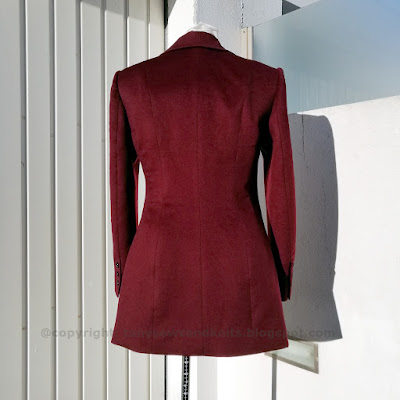

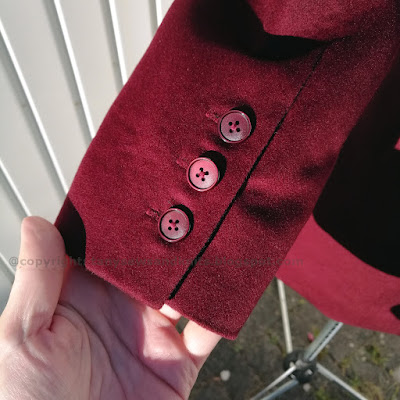
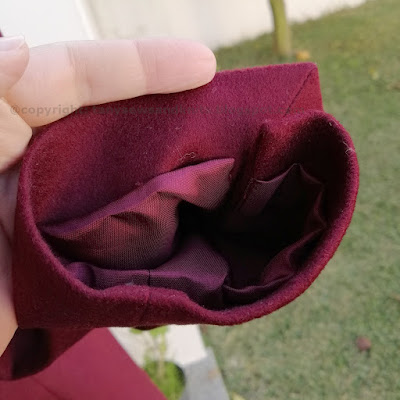
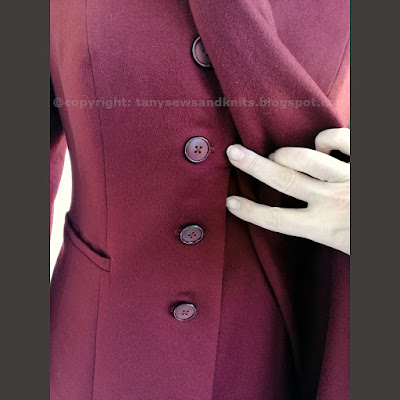
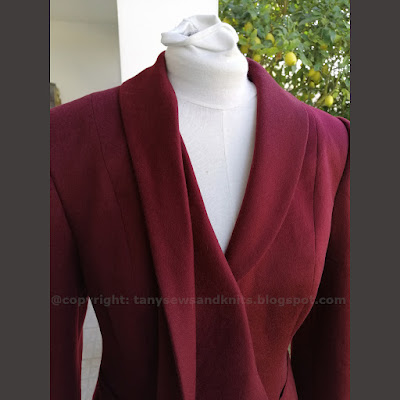
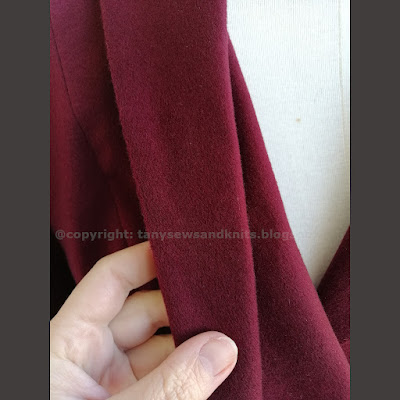






Tany, that is so gorgeous, I love everything about it. the color is great and I want to see it on you! That scarf effect is so interesting and your sewing is perfection....Beth
ReplyDeleteBeautiful garment and fabric! And I agree, stunning lines. I understand why you so value those designer issues. Is the double row of scarf stitching through double of all layers after the scarf is folded "in half"? Why did you choose a knit underlining instead of woven? Thanks.On
ReplyDeleteSorry to hear you are again in work from home.
Thanks Beth! <3
ReplyDeleteColo Heather, thank you! The stitching on the scarf is made according to the markings on the scarf pattern (notice the two parallel lines), overlapping and stitching along the line to create a permanent pleat, not by turning the scarf in half... I guess I could also have draped the scarf anyway I liked and tacked it, not following the pattern indication. Leaving it untacked is out of the question because the scarf would hang open and the effect wouldn't be the best. I used knit fusible underlining because the woven would alter the drape of the cashmere dramatically. I did use woven interfacing on the fronts, front side panels, upper back, hems, sleeve heads and sleeve vents (anywhere where a stronger structure was needed). Note that underlining with knit fusible doesn't apply to any jacket... It depends on the fabric. This particular fabric was too soft, like something I'd use to make a dress, not a blazer. I had to underline it to make it more suitable for a blazer.
I love your fantastic version. It is taken from my favourite Burda of all.
ReplyDeleteI unfortunately lost the pattern sheets and am not able to make my own version of this pattern. Ah well.......
I love your fantastic version. It is taken from my favourite Burda of all.
ReplyDeleteI unfortunately lost the pattern sheets and am not able to make my own version of this pattern. Ah well.......